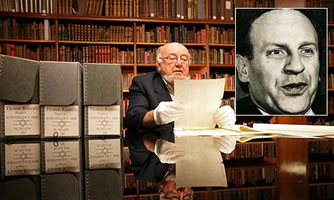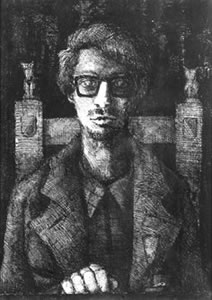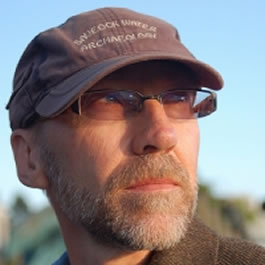De Nederlandse schrijver en dichter Simon Carmiggelt werd geboren op 7 oktober 1913 in Den Haag. Zie ook alle tags voor Simon Carmiggelt op dit blog.
Tekst voor een wijnkaart
O,drank, je hebt zoveel verpest.
Toch ben je in mijn dorstig leven
altijd die ene hoer gebleven,
die mij het diepste heeft gelest,
want hoe je me ook hebt geflest
door altijd (en ik kon het weten)
al je beloften te vergeten,
als je weer klaar lag voor de rest,
en hoe je m’ook hebt uitgemest
door alles wat je van me nam,
ik leefde als ik bij je kwam,
bij jou alleen. Dat weet je best.
Je grokstem en je valse streken,
de stomme platheid van je spreken
en van je bed de wulpse stank,
’t was niets, als ik maar weg mocht zinken
in jou om steeds weer in te drinken
jouw zoete leugen-bitt’re drank.
De schilder
Zijn vrees staat als een bevend spook
te kijk op zijn Picasso-doeken.
Steeds angst, op al die Talens-koeken.
En in de keuken staat ze ook.
Want deze vrouw, zo fel en kloek,
verdreef hem uit de luwe sferen
van landschap en van jutteperen,
te hoop gelopen op het doek.
O kalme jaren, toen hij dat nog deed:
de lichtvlek mikken op de vaas,
de gaatjes nadoen van de kaas.
Dat stille werk dat niemand leed.
Maar zij dreef blauwzuur in zijn coloriet.
Haar strengheid tormenteert zijn kwast,
en als zijn angst zich paars ontlast,
ageert hij tegen haar ‘Kom eten, Piet.
Mijn zoontje
Mijn zoontje wil de sneeuw bewaren
en vlinders op zijn petje dragen.
Aan mij komt hij gewillig vragen,
hoe hij zijn dartel schip moet varen.
Vertrouwen glinstert in zijn oog
en maakt mij wel eens moedeloos.
Ik knijp zijn handje en ben boos
omdat ik hem zo vaak bedroog.
Ik weet dat eens het uur zal komen,
dat hij mijn ganse onmacht kent
en hoogstens glimlacht om de vent
die heldje speelde in zijn dromen.
Als dan mijn dag ten einde spoedt
en reeds verschemert naar de nacht,
is hij een man, die leeft en lacht.
Want alles gaat, zoals het moet.

De Amerikaanse schrijfster Rachel Kushner werd geboren op 7 oktober 1968 in Eugene, Oregon. Zie ook alle tags voor Rachel Kushner op dit blog.
Uit: Telex From Cuba
“There it was on the globe, a dashed line of darker blue on the lighter blue Atlantic. Words in faint italic script: Tropic of Cancer. The adults told her to stop asking what it was, as if the dull reply they gave would satisfy: “A latitude, in this case twenty-three and a half degrees.” She pictured daisy chains of seaweed stretching across the water toward a distant horizon. On the globe were different shades of blue wrapping around the continents in layers. But how could there be geographical zones in the sea, which belongs to no country? Divisions on a surface that is indifferent to rain, to borders, that can hold no object in place? She’d seen an old globe that had one ocean wrapping the Earth, called Ocean. In place of the North Pole was a region marked “Heaven.” In place of the South Pole, “Hell.”
She selected the color black from a list of topics and wrote her book report, despite feeling that reducing Treasure Island to various things colored black was unfaithful to the story, which was not about black, but perhaps how boys need fathers, and how sometimes children are more clever than adults and not prone to the same vices. The Jolly Roger was black, and there was Black Dog, who showed up mysteriously at the Admiral Benbow, demanding rum. There were black nights on the deserted island, creeping around in shadows amid yet more blackness: the black of danger. Also, the “black spots” that pirates handed out—a sort of threat. A death sentence, really. “Who tipped me the black spot?” asked Silver. This death sentence, a stain of wood ash on a leaf of paper. The leaf, torn from a Bible, which now had a hole cut into Revelation. And holes are black as well.
She’d read about Sargasso, a nomadic seaweed city, and hoped they would encounter some. Other things floated on the ocean as well: jetsam, which is what sailors toss overboard to lighten their load, and flotsam, things caught and pushed out to sea, such as coconuts, which rolled up on the shores of Europe in a time before anyone knew what lay to the west. Maybe coconuts still washed up, but they weren’t eerie and enchanting now that you could buy one at the store. In that earlier time, people displayed them as exotic charms. Or cut them open. A strange white fluid poured out, greasy and foul-smelling. Not poisonous, just spoiled from such a long and difficult journey, a fruit thousands of miles from its home under the green fronds of a palm tree.”

De Australische schrijver Thomas Keneally werd geboren op 7 oktober 1935 in Sydney. Zie ook alle tags voor Thomas Keneally op dit blog.
Uit: Schindler’s Ark
“The family Schindler was Catholic. So too was the family of young Amon Goeth, by this time also completing the Science Course and sitting for the Matura examinations in Vienna.
Oskar’s mother, Louisa, practiced her faith with energy, her clothes redolent all Sunday of the incense burned in clouds at High Mass in the Church of St. Maurice. Hans Schindler was the sort of husband who drives a woman to religion. He liked cognac; he liked coffeehouses. A redolence of brandy-warm breath, good tobacco, and confirmed earthiness came from the direction of that good monarchist, Mr. Hans Schindler.
The family lived in a modern villa, set in its own gardens, across the city from the industrial section. There were two children, Oskar and his sister, Elfriede. But there are not witnesses left to the dynamics of that household, except in the most general terms. We know, for example, that it distressed Frau Schindler that her son, like his father, was a negligent Catholic.
But it cannot have been too bitter a household. From the little that Oskar would say of his childhood, there was no darkness there. Sunlight shines among the fir trees in the garden. There are ripe plums in the corner of those early summers. If he spends a part of some June morning at Mass, he does not bring back to the villa much of a sense of sin. He runs his father’s car out into the sun in front of the garage and begins tinkering inside its motor. Or else he sits on a side step of the house, filing away at the carburetor of the motorcycle he is building.
Oskar had a few middle-class Jewish friends, whose parents also sent them to the German grammar school. These children were not village Ashkenazim—quirky, Yiddish-speaking, Orthodox—but multilingual and not-so-ritual sons of Jewish businessmen. Across the Hana Plain and in the Beskidy Hills, Sigmund Freud had been born of just such a Jewish family, and that not so long before Hans Schindler himself was born to solid German stock in Zwittau.
Oskar’s later history seems to call out for some set piece in his childhood. The young Oskar should defend some bullied Jewish boy on the way home from school. It is a safe bet it didn’t happen, and we are happier not knowing, since the event would seem too pat. Besides, one Jewish child saved from a bloody nose proves nothing. For Himmler himself would complain, in a speech to one of his Einsatzgruppen, that every German had a Jewish friend. ” ‘The Jewish people are’going to be annihilated,’ says every Party member. ‘Sure, it’s in our program: elimination of the Jews, annihilation—we’ll take care of it.’ And then they all come trudging, eighty million worthy Germans, and each one has his one decent Jew. Sure, the others are swine, but this one is an A-One Jew.”

De Nederlandse schrijfster en beeldend kunstenares Dirkje Kuik werd geboren in Utrecht op 7 oktober 1929. Zie ook alle tags voor Dirkje Kuik op dit blog.
Het museum Jo, weet je nog.
kleine vriendelijke doffer, wie weet,
Alle schilderkunst sloegen we
over, behalve Sinte Caecilia
en de graflegging, ons heer
in zijn glazen kastje, schilder
de meester van pintor Scorel zegt men.
Zeer beschadigd waren we, dronken
van vreugde en wijn, venijn van de kunst,
een gunst zo maar gegeven, drie gulden,
aangeschoten doffer weet je nog,de toegang.

De Canadese schrijver, archeoloog, antropoloog Steven Erikson (pseudoniem van Steve Rune Lundin) werd geboren in Toronto op 7 oktober 1959. Zie ook alle tags voor Steven Erikson op dit blog.
Uit:The Crippled God
“Cotillion drew two daggers.His gaze fell to the blades.
The blackened iron surfaces seemed to swirl, two pewter rivers oozing across pits and gouges, the edges ragged where armour and bone had slowed their thrusts. He studied the sickly sky’s lurid reflections for a moment longer, and then said, ‘I have no intention of explaining a damned thing.’ He looked up, eyes locking. ‘Do you understand me?’
The figure facing him was incapable of expression. The tatters of rotted sinew and strips of skin were motionless upon the bones of temple, cheek and jaw. The eyes held nothing, nothing at all.
Better, Cotillion decided, than jaded scepticism. Oh, how he was sick of that. ‘Tell me,’ he resumed, ‘what do you think you’re seeing here? Desperation? Panic? A failing of will, some inevitable decline crumbling to incompetence? Do you believe in failure, Edgewalker?’
The apparition remained silent for a time, and then spoke in a broken, rasping voice. ‘You cannot be so . . . audacious.’
‘I asked if you believed in failure. Because I don’t.’
‘Even should you succeed, Cotillion. Beyond all expectation, beyond, even, all desire. They will still speak of your failure.’
He sheathed his daggers. ‘And you know what they can do to themselves.’
The head cocked, strands of hair dangling and drifting. ‘Arrogance?’
‘Competence,’ Cotillion snapped in reply. ‘Doubt me at your peril.’
‘They will not believe you.’
‘I do not care, Edgewalker. This is what it is.’
When he set out, he was not surprised that the deathless guardian followed. We have done this before. Dust and ashes puffed with each step. The wind moaned as if trapped in a crypt. ‘Almost time, Edgewalker.’
‘I know. You cannot win.’
Cotillion paused, half turned. He smiled a ravaged smile. ‘That doesn’t mean I have to lose, does it?’

Zie voor nog meer schjrijvers van de 7e oktober ook mijn vorige blog van vandaag.
